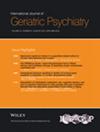Identifying and Addressing Unmet Needs in Dementia: The Role of Care Access and Psychosocial Support
Abstract
Objectives
People with dementia often have various unmet care needs across physical, psychological, environmental, and social domains. There’s a need to explore the association between domains of unmet needs and characteristics of people with dementia. The aim of this paper was to describe the domains of unmet and met needs among community-dwelling people living with dementia, focusing on the home environment, physical, psychological, and social areas, and to identify sociodemographic, clinical, and health-related parameters associated with unmet needs.
Methods
We analyzed the InDePendent trial’s baseline data of N = 417 people with dementia. The Camberwell Assessment of Needs for the Elderly (CANE) was used to identify needs. Descriptive statistics were used to evaluate the distribution of needs and Logistic and Poisson regression models to detect sociodemographic and clinical factors associated with unmet needs in the four need domains.
Results
People with dementia were on average 80.6 years old, mostly female (56%) and mildly to moderately cognitively impaired (85%). 98.6% of the participants had at least one need, of which just over a third (36.5%) were rated as met and just under two-thirds (63.5%) as unmet. Lacking a care grade (access to social care) and low education were found to be risk factors for the occurrence of unmet needs in almost all areas. Factors such as increased medication use (OR = 1.10 [95%CI 1.02 to 1.19]) and loneliness (OR = 2.51 [95%CI 1.44 to 4.36]) were associated with a higher likelihood of unmet environmental needs. Similarly, the absence of a caregiver (OR = 2.81 [95%CI 1.03 to 7.64]), lower social support (OR = 1.71 [95%CI 1.02 to 2.84]), and poor physical health (OR = 8.40 [95%CI 3.39 to 20.81]) correlated with unmet physical needs. Participants living alone demonstrated higher levels of unmet physical needs (β = 0.27 [95%CI 0.01 to 0.53]). Depression (OR = 2.13 [95%CI 1.10 to 4.08]), living alone (OR = 1.73 [95%CI 1.04 to 2.86]) and poor physical health (OR = 2.82 [95%CI 1.15 to 6.93]) significantly increased the risk of unmet psychological needs. Social needs are more likely to be unmet in females (OR = 1.88 [95%CI 1.05 to 3.37]). Sensitivity analyses showed the positive effects of regular General Practitioner (GP) visits on the fulfillment of social needs (β = −0.61 [95%CI −1.01 to −0.22]).
Conclusion
Access to comprehensive care, for example, through a care grade, education and regular visits to the GP, is just as important for meeting needs in various areas as psychosocial measures aimed at reducing loneliness, living alone, and social exclusion. Both areas must be given equal consideration to improve the living and care situation of people with dementia sustainably.
Trial Registration: The study is registered as a clinical trial (ClinicalTrials.gov Identifier: NCT04741932). The study protocol is published elsewhere

 求助内容:
求助内容: 应助结果提醒方式:
应助结果提醒方式:


